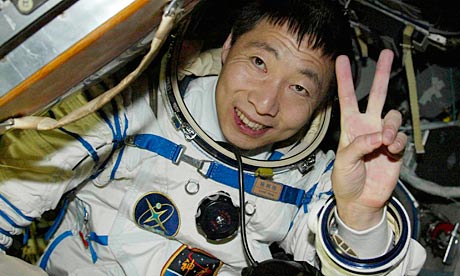|
 Yang Liwei, China's first astronaut, steps out of the re-entry capsule of Shenzhou-5, China's first manned spacecraft, in 2003. Photograph: Wang Jianmin/Corbis Yang Liwei, China's first astronaut, steps out of the re-entry capsule of Shenzhou-5, China's first manned spacecraft, in 2003. Photograph: Wang Jianmin/Corbis China could put an astronaut on the moon in 2025 and launch probes to explore Mars and Venus within five years, according to the boss of a Chinese space programme.
Ye Peijian said China could make its first manned moon landing in 15 years, send a probe to Mars by 2013 and to Venus by 2015.
"China has the full capacity to accomplish Mars exploration by 2013," he added.
The remarks, by the commander in chief of the country's Chang'e lunar exploration project, were reported by the English language Global Times today and underscore the ambition of China's plans.It was understood that Ye was speaking in his capacity as an academic at an aerospace engineering forum at the Chinese Academy of Sciences, rather than unveiling official policy.
It is seven years since China became only the third country to put one of its citizens in space. Another astronaut, Zhai Zhigang, conducted its first spacewalk in 2008.
Yang Liwei, China's first spaceman, confirmed this weekend that the country planned to set up its first orbital space station by around 2020, according to the People's Daily website.
Visiting the space centre in Xi'an, Yang said China would launch its first unmanned space laboratory, Tiangong-1, next year. It is expected to dock with the Shenzhou-8 craft in a first step towards building a space station.
"[The space programme] has been developing very quickly, but of course still lags far behind when compared with the US and Russia because they have the most advanced technology," Professor Fu Song, vice-dean of Tsinghua University's School of Aerospace in Beijing, told the Guardian.
He said of the proposed moon landing: "It is obviously a very difficult task, but I think in terms of technology, China can do it – the US was technically able to do that almost half a century ago. So for China now it is more about whether the government will make the decision to do it, or whether it is really necessary for the country."
He added: "The national pride part [of the programme] has always been one important reason, but it is more than that as well. The scientific value of space exploration is [im]measurable … The moon is an unknown world to us and there are a lot of things waiting to be explored."
He said there could be energy resources still awaiting discovery, and that the moon could help in the study of the state of the Earth and universe before the dawn of humanity.Barack Obama has been criticised for dropping a plan to return Americans to the moon by 2020. Instead, the US president has announced an initiative aiming to see crewed missions beyond the moon by 2025.
Although China and the US remain suspicious of each other's space plans, particularly since much of the technology could have military applications, they agreed last year to open a dialogue on space exploration.
But China is also looking elsewhere for support. In late 2008, the Asia-Pacific Space Co-operation Organisation launched in Beijing.
http://www.guardian.co.uk/world/2010/sep/20/china-could-make-moon-landing-by-2025 |